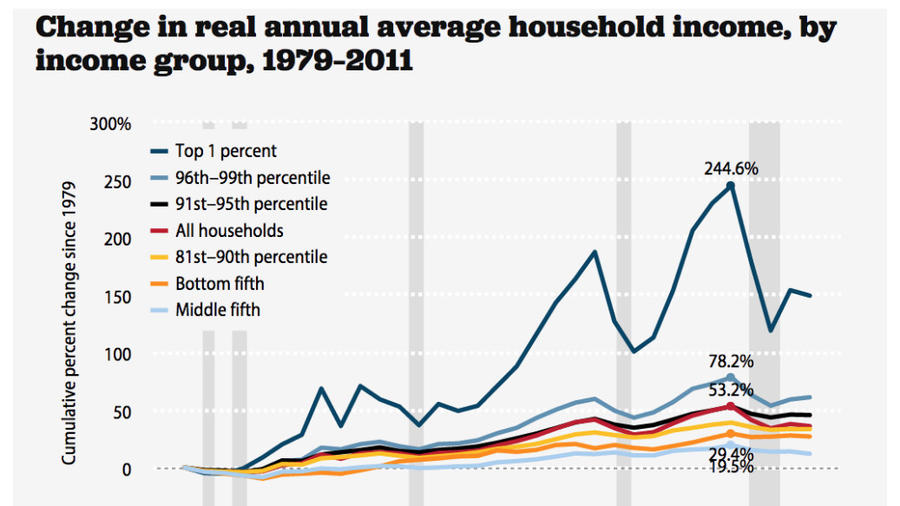The american people aren't this stupid..
Conservatives are trying to prove income inequality is a myth and failing - LA Times

Conservatives are trying to prove income inequality is a myth and failing - LA Times
it becomes ever more clear that income inequality will be a defining issue in the upcoming presidential race--if not the defining issue--conservative economists and pundits are pulling out all the stops to persuade us that there's no there there.
has been doing just fine over the decades since 1970. In fact, they've done great. If American politicians felt comfortable about cribbing a catch phrase from the British, you might be hearing echoes of Harold Macmillan's 1957 slogan, "You never had it so good," on American airwaves. Of course, that might undercut Republicans' argument that it's time for them to take over the White House, so maybe not.
Then what's the goal of these efforts to prove that inequality is a myth? It's to justify those policies that have been widely blamed for inequality. These include tax cuts favoring the wealthy, union-busting, and the reclassification of employees as independent contractors.
So let's take a closer look at these studies. The most prominent author is Martin Feldstein, who was Ronald Reagan's chief economist and is now a professor of economics at Harvard. In a recent commentary, Feldstein urged his readers not to "lose sight of how well middle-income families have actually done over the past few decades." Their gains, he asserted, have been concealed by "misleading statistics that grossly understate these gains."
Feldstein cites government statistics showing that "the real incomes of those at the middle of the income distribution [that is, the median income] have increased about 50% since 1980." He says the increase is even higher if one expands the definition of income beyond cash wages and includes near-cash benefits like food stamps and in-kind benefits like health care," and subtracts federal taxes, which have fallen for middle-income taxpayers from 19% of pre-tax income in 1980 to 11.5% in 2010.
define this group demographically, as two economists from the St. Louis Federal Reserve did recently, what were once thought of as middle-class households have slipped well down the income ladder.
What about benefits and taxes? Feldstein seems to think that food stamps are a middle-class entitlement.Under federal rules, however, the maximum gross household income for food stamps for, say, a family of four, is $31,000. Middle class?
Healthcare costs, of course, have been rising; those obtaining employer-sponsored insurance have been consistently shouldering more of the premium cost, while in many cases benefits have been shrinking. And out-of-pocket payments have run well ahead of inflation over the years. Americans spent $25 billion out of pocket in 1970, according to government figures; by 2013, that figure was $339 billion, more than half what it would have been if it rose by the same rate as consumer inflation.
Feldstein's figure for gains from technology are particularly nebulous. How does he know they're worth 1% a year? How does he account for the fact that access to advanced technology declines as one slips down the income ladder. According to the Pew Research Center, for instance,91% of households with income of $75,000 or more had access to broadband Internet service. For households earning less than $30,000, the figure was 52%.
Taxes? Feldstein employs a familiar sleight-of-hand by limiting his analysis to federal taxes, which are still progressive. Factor in state and local levies, and the middle- and working classes are getting socked. The average share of family income paid in those levies was sharply regressive overall, according to the Institute on Taxation and Economic Policy. The lowest 20% of households, earning $19,000 or less, paid 10.9% of their income in state and local taxes. For the middle fifth, it was 9.4%. For the top 1%, it was only 5.4%.
Another widely noted study by Robert Z. Lawrence of the Peterson Institute for Economic Analysis argues that since overall labor income has kept pace with productivity, the crisis in middle-class incomes has been misunderstood. Lawrence acknowledges that there's a widening gap between productivity and compensation, but says it's only appeared since 2000, not the 1970s. He acknowledges that "production" workers have suffered over the long term, but says it has little to do with the ebbing of worker bargaining power thanks in part to the weakening of unions, and more to do with the rising cost of goods and services such as housing and education.
Lawrence makes several adjustments to statistics to support this conclusion, but one key to his method is to track all income, from CEOs down to the factory floor. As several critics have noted, if you do that it's not surprising that income has kept pace with productivity. The issue isn't whether productivity produces income; it's who pockets the income.
The trends are indisputable that an increasing share is flowing to the very top: supervisors and executive ranks. Production and nonsupervisory workers have been consistently shortchanged since the 1970s. That distinction disappears if you put all compensation in the same pot. As economist Dean Baker of the Center for Economic and Policy Research put it, "progressive economists had long known that the story of wage stagnation was overwhelmingly a story of redistribution among workers, from factory workers and retail clerks, to doctors, bankers, and CEOs...The fact that average compensation had kept pace with productivity was hardly news to any of us."


